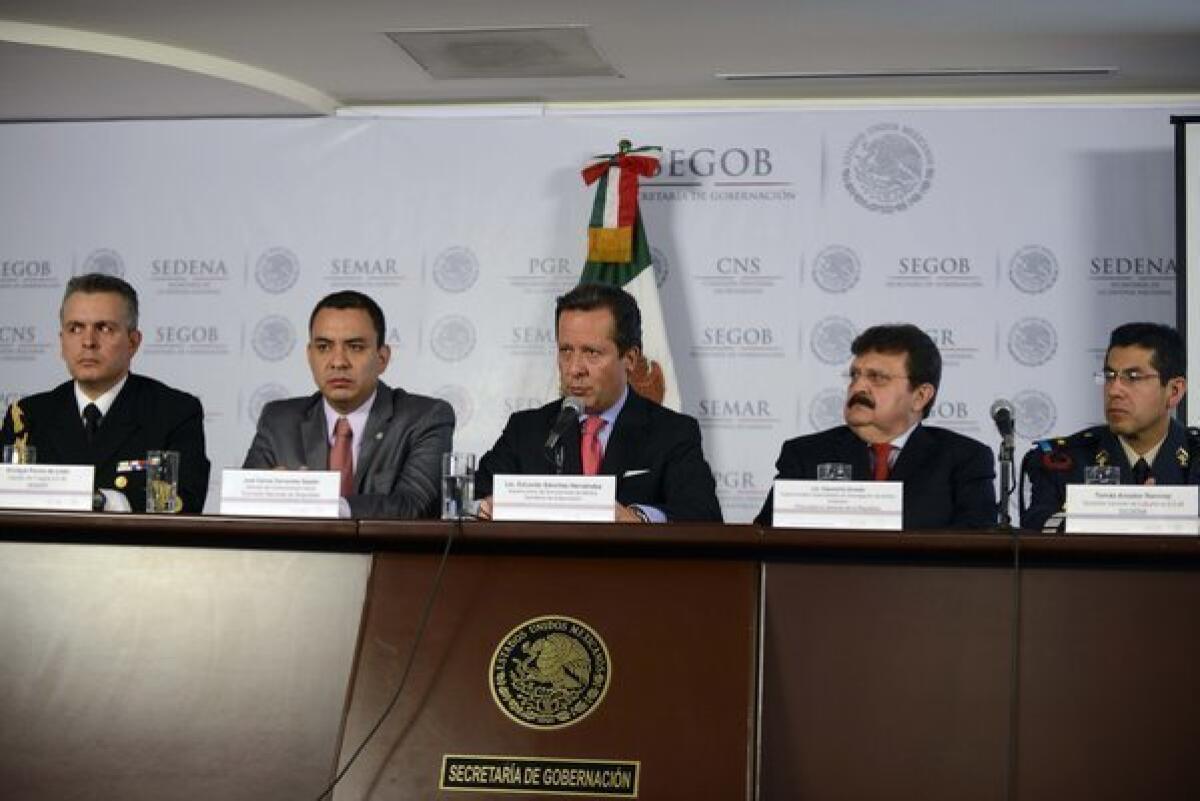Mexico captures drug kingpinâs father-in-law

MEXICO CITY â On the eve of President Obamaâs trip to Mexico, Mexican authorities on Tuesday announced the capture of a key drug cartel operative, the father-in-law and associate of one of the worldâs most-wanted fugitive kingpins.
The major arrest â the first under new President Enrique Peña Nieto â comes as the extraordinarily close U.S.-Mexican cooperation in the drug war is undergoing significant changes.
The Los Angeles Times reported this week that officials of the 5-month-old Mexican administration were alarmed to discover how deeply involved U.S. advisors were in sensitive areas of security and law enforcement during the six-year government of former President Felipe Calderon.
As a consequence, the new government plans to narrow American participation in its agencies and activities, confining U.S. contacts to more limited channels. The development is unnerving U.S. officials, who have overseen a program of nearly $2 billion in support to Mexicoâs drug war, including the training of police and judicial institutions.
Asked Tuesday about these shifts, Obama said in Washington that he would wait to âjudge how this will alter the relationshipâ until he speaks directly with Peña Nieto on Thursday âto see exactly what are they trying to accomplish.â
But a Mexican official told The Times that Mexican Interior Minister Miguel Angel Osorio Chong had informed his counterpart, Janet Napolitano, of the new restrictions in April. Osorio, in Washington for a series of meetings, told the American officials that future contact would be solely through his office, the source said.
âIt was like deer in headlightsâ when Peña Nietoâs officials began to examine the way Mexican government security agencies were working and discovered an American advisor at every turn, a U.S. official said.
Some of the changes under Peña Nieto reflect how his Institutional Revolutionary Party, or PRI, prefers to do things, with all power concentrated in a few hands at the top. But it also reflects irritation within the new Mexican government over how badly the attorney generalâs office and the Interior Ministry, under U.S. tutelage during the Calderon years, botched a string of high-profile drug prosecutions, the vetting of new police forces and other projects.
Plus Peña Nieto, whose party has long used the issue of sovereignty as a rallying cry, gets points in some quarters for appearing to stand up to â and cut down â the Americans.
Yet the sharing of U.S. intelligence that flourished under Calderon was a crucial element in precisely the kind of high profile arrest that was announced Tuesday.
Ines Coronel Barrera, 45, was captured early Tuesday in the border state of Sonora by federal police, who also confiscated marijuana destined for Arizona, weapons, vehicles and four presumed bodyguards, the Interior Ministry announced.
Coronel is the father of Emma Coronel, who married Mexicoâs most powerful drug baron, Joaquin âChapoâ Guzman, nearly six years ago when she was an 18-year-old beauty queen. Guzmanâs third wife, Emma Coronel gave birth to twin girls in the Los Angeles area in August 2011.
Coronel is also considered by authorities to be a key player in fugitive billionaire Guzmanâs vast empire, and in January he was added to the U.S. Treasury Departmentâs so-called kingpin black list, which called him a major marijuana trafficker and banned U.S. companies, banks and individuals from doing business with him.
The Coronel arrest was a reminder of the areas in which the U.S. and Mexicans have worked most closely and efficiently, succeeding in weakening some cartels, although others grew and proliferated.
Eduardo Sanchez, the spokesman for the Interior Ministry who announced Tuesdayâs capture, was asked repeatedly what role U.S. intelligence had in the takedown of Coronel. He cited a list of Mexican government agencies that worked âin close coordination with each otherâ to begin the process of bringing Coronel to justice and âcontribute to a Mexico in peace.â
The drug war under Calderon unleashed waves of violence across the country that claimed more than 70,000 lives and led to the disappearance of thousands of people. Peña Nieto, whose party ruled with an autocratic air for seven decades until losing the election in 2000, promised a weary Mexican society to reduce violence in his successful bid last year to return the PRI to presidential power.
Narrowing the American role also fits into his strategy of emphasizing other issues, like the economy and trade, to deflect attention from organized crime, even though the power of the cartels and the killing continue in much of the nation.
More to Read
Sign up for Essential California
The most important California stories and recommendations in your inbox every morning.
You may occasionally receive promotional content from the Los Angeles Times.











